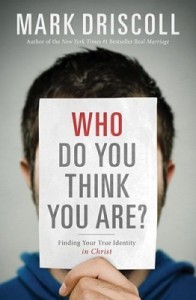Who do you think you are
by Mark Driscoll
Thomas Nelson
256 pages
——
Stop for a moment and ask yourself this question: “Who am I?” The way we answer this question, the way we see ourselves, is our identity. One of the major struggles in life is the issue of our identity or self-image.
In his latest book, pastor and church planter Mark Driscoll draws extensively from the book of Ephesians and his many years as a Christian counsellor to teach and remind Christians that our true identity is found in Christ. Combining sound biblical teaching with powerful testimonials from members of Mars Hill Church, Driscoll seeks to help us discover the power and joy that is only found in an identity founded and sustained in and by Jesus.
Mark Driscoll is a polarising preacher and author that people seem to be drawn to love or hate. I have to confess that I fall in the former camp. His communication style can be incredibly blunt and sometimes laced with humorous and slightly irreverent barbs but it is hard to find fault with his passionate zeal for Jesus, his faithful teaching, and his deep insight into God’s word. As he has matured, much of what may have originally caused offense is no longer present in his writing and preaching.
The tone of this book is one of a loving Christian counsellor and brother in Christ who has something very important to share with you. Love him or hate him I’d encourage you to read and be convicted by this book.
The first two chapters alone are worth the purchase price of the book. In his inimitable style, Driscoll unrelentingly applies sound biblical doctrine to our culture and mercilessly exposes its deceptions against the truths of the Bible.
Created to worship God, our culture has rejected him and worships anyone or anything other than God. This sinful false worship has led to our identity becoming rooted in idolatry instead of in Christ. As a helpful mnemonic, Driscoll turns ‘idols’ into an acronym (Items, Duties, Others, Longings, Suffering) and demonstrates how insidiously, since the Fall, Satan has deceived us into basing our identity and self worth in idols and not in God, in whose image and likeness we are made.
The remaining 14 chapters explore what it means to be ‘in Christ’ by working through the book of Ephesians. In a refreshing look at this complex letter, Driscoll displays his gifts as a Bible teacher, focusing on the theme of union with Christ – a theme referred to 34 times in the book. His accessible, information packed, to-the-point manner will be enjoyed and appreciated by new believers and mature Christians alike.
Driscoll reminds us with each proceeding chapter of who we are in Christ. ‘I Am a Saint’ (chapter 3); ‘I Am Blessed’ (chapter 4 and so on); ‘Appreciated’, ‘Saved’, ‘Reconciled’, ‘Afflicted’, &lslsquo;Heard’, ‘Gifted’, ‘New’, ‘Forgiven’, ‘Adopted’, ‘Loved’, ‘Rewarded’ and ‘Victorious’. “I AM” (God) displays these characteristics; created in his image and now being in Christ through the work of his Spirit we increasingly do so as well. The cumulative effect of these biblical truths is liberating, centering and deeply personally convicting.
What struck me most about “Who do you think you are” is its value from a Christian counselling perspective. When you read it you can feel through the pages our desperate need to ground our self worth, our self belief and our whole identity in Christ. As you are reminded of who you are in Christ, the pressure valve of our false expectations about life is slowly released and all that is left is to marvel at the joy and hope and purpose that can only be found in Jesus.
This week, Mars Hill church has posted the first sermon Mark Driscoll has preached on the topic of this book. Click here to visit the site and listen to the sermon.
Paul White is a business owner who has undertaken part time studies at Moore College and in 2012 studied with Cornhill Sydney, a part time course designed to help individuals develop skills for biblical teaching and preaching. He is also the proud father of a one month old son, to whom he gave the middle name Driscoll.
Email This Story
Why not send this to a friend?




